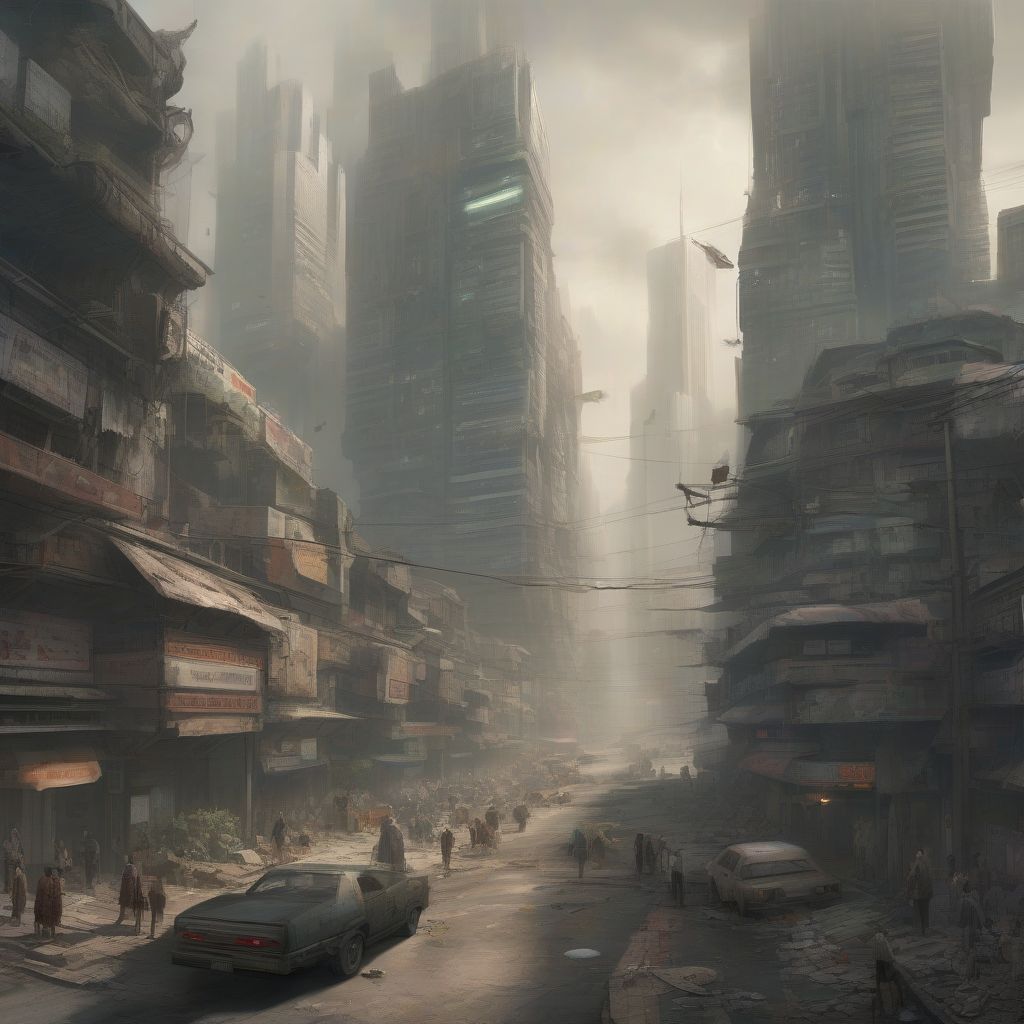Have you ever finished a science fiction novel and felt a lingering sense of unease, even though the technology and world-building were fascinating? That’s the power of dystopian themes in science fiction. Dystopias, with their cautionary tales and explorations of societal fears, have long been intertwined with the genre, sparking debates and influencing how we view our present and future.
 Dystopian City in Science Fiction
Dystopian City in Science Fiction
Exploring the Dark Side: What Makes Dystopian Themes So Impactful?
Dystopian fiction doesn’t shy away from darkness. Instead, it shines a light on the potential consequences of unchecked power, technological advancements, and social inequalities. This unflinching examination of our darkest fears resonates deeply with readers. Here’s why:
- Reflection of Reality: Dystopian stories often exaggerate existing societal issues, such as surveillance, censorship, and environmental degradation. This reflection of our world, albeit a warped one, makes these narratives incredibly thought-provoking. We’re forced to confront uncomfortable truths and question the trajectory of our own society.
- Moral and Ethical Dilemmas: By presenting extreme scenarios, dystopian fiction compels us to grapple with complex moral and ethical dilemmas. Would we conform to a totalitarian regime for a sense of security? How would we fight for justice in a world where freedom is but a distant memory? These questions linger long after we’ve finished the book.
- Catalyst for Discussion: Dystopian themes are inherently social and political. They force us to confront uncomfortable realities about power, control, and the very nature of humanity. This naturally leads to passionate discussions about our values, responsibilities, and the kind of future we want to create.
Shaping the Conversation: How Dystopian Themes Influence Science Fiction Discussions
The influence of dystopian themes on science fiction extends beyond the pages of books and into classrooms, online forums, and even casual conversations. Here’s how:
- Fueling Our Imagination: Dystopian narratives provide a framework for exploring potential futures and their ramifications. This imaginative playground allows us to dissect complex societal issues, test hypothetical scenarios, and engage in critical thinking about the choices we make today.
- Generating Critical Analysis: Science fiction, with its dystopian narratives, encourages a deeper understanding of social and political structures. We’re challenged to analyze power dynamics, question authority, and consider the potential consequences of technological advancements.
- Inspiring Action: While dystopian themes often paint a bleak picture of the future, they can also serve as a call to action. By highlighting the dangers of complacency and inaction, these narratives can inspire us to become more engaged citizens, advocate for change, and strive for a better future.
From Page to Screen: The Enduring Influence of Dystopian Classics
The impact of dystopian themes is undeniable, with classic novels like George Orwell’s “1984” and Margaret Atwood’s “The Handmaid’s Tale” continuing to spark debates and influence contemporary works.
- “1984” and the Dangers of Totalitarianism: Orwell’s masterpiece, with its depiction of a surveillance state and the suppression of individual thought, remains eerily relevant in the digital age. It serves as a stark reminder of the importance of privacy, freedom of speech, and critical thinking.
- “The Handmaid’s Tale” and the Fight for Bodily Autonomy: Atwood’s chilling portrayal of Gilead, a society where women are stripped of their rights, resonates deeply with contemporary concerns about reproductive rights and gender equality. The novel’s exploration of female agency and resistance continues to inspire conversations and activism.
Beyond the Classics: Contemporary Dystopian Works Fueling the Discussion
Dystopian themes continue to resonate with modern audiences, with contemporary authors exploring new anxieties and societal fears.
- Climate Change and Environmental Collapse: Books like Paolo Bacigalupi’s “The Water Knife” and Claire Vaye Watkins’ “Gold Fame Citrus” explore the devastating consequences of climate change, resource scarcity, and environmental collapse, reflecting growing anxieties about the future of our planet.
- Technological Advancements and Artificial Intelligence: In an era marked by rapid technological advancements, novels like Dave Eggers’ “The Circle” and Ted Chiang’s “Stories of Your Life and Others” delve into the ethical implications of artificial intelligence, data privacy, and the erosion of human connection in a digitally driven world.
Joining the Conversation: How You Can Participate
The beauty of science fiction, particularly dystopian narratives, lies in their ability to spark conversations and inspire critical thinking. Here’s how you can engage:
- Read Widely and Critically: Explore both classic and contemporary dystopian works. Analyze the themes, characters, and social commentary presented. What resonates with you? What challenges your perspectives?
- Join Book Clubs and Online Forums: Engage in discussions with fellow readers. Share your interpretations, debate the author’s message, and explore the real-world implications of the themes presented.
- Use Your Voice: Don’t be afraid to share your thoughts and insights. Write reviews, participate in online discussions, or even start a blog.
Dystopian themes in science fiction are not meant to instill fear but to ignite our imagination, encourage critical thinking, and inspire us to create a better future. By engaging with these narratives, we can better understand the challenges facing our world and work towards solutions that ensure a brighter tomorrow.
[amazon bestseller=”dystopian fiction”]
